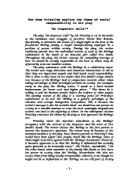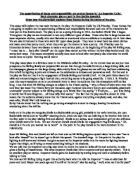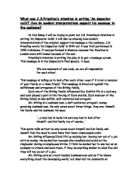'We don't live alone. We are members of one body. We are responsible for each other.' What is Priestley's main aim in An Inspector Calls? How successfully does he achieve it?
English Coursework 1 Modern Play An Inspector Calls 'We don't live alone. We are members of one body. We are responsible for each other.' What is Priestley's main aim in An Inspector Calls? How successfully does he achieve it? An Inspector Calls is about a rich british family, the Birlings, an inspector, Gerald Croft, Eva Smith and a few minor characters iswell. It is a story set in the early years of the 20th century, about a family, who are rich and british, and who mostly just care about themselves and think nothing bad is going to happen to them, especially Arthur Birling, a prosperous manufacturer, in the story, Arthur Birling is holding a family dinner party to celebrate his daughter, Sheila Birlings engagement to Gerald Croft, a son of a wealthy man who runs a successful company. This family dinner party soon gets interrupted by a firm and harsh police inspector, inspector Goole, who is investigating the suicide of a young woman, Eva Smith. The play starts off on a positive attitude, but soon ends in tragedy as, under the interrogation of inspector Goole, we soon discover that each member of the Birling Family turn out to have played a part in the suicide of Eva Smiths death. The aim of the story is to, try to teach each and every reader that we should not think so highly of ourselves, that we shouldn't be rude or selfish to others, and that we should not act as if
What is the purpose of the inspector in the play
What is the purpose of the inspector in the play "An Inspector Calls"? How does the inspector ensure in the versions you have watched, that he is successful in achieving his purpose? An Inspector Calls by J.B Priestly was first performed in 1945. The play was set in 1912 before the war; it centres around the wealthy Birling family. A visit from the mysterious Inspector Goole proves to be a horrifying experience for the Birling's as they learn that they have all played a part in the suicide of a young girl called Eva Smith. The 'moral' of the play is was to encourage people to take responsibility for their actions, not to shift the blame on to others. Priestly attempts to convey his attitudes and ideas through the characters in the play. The Inspector represents the voice of Priestley. He believes in community and if we don't work together then disaster is inevitable. Priestley's main aim in the play was to show what would happen if we didn't work together as a community. The play is there to highlight the problems of class divide; he wanted his audiences to learn something from his plays. The main character of the play is 'Inspector Goole', an enigmatic character who reveals very little of himself, but instead spends his time digging up the secrets of the Birling family and exposing them amongst themselves. He does this because he is aware that the Birlings are largely
What is the role of the inspector in An Inspector Calls.
Coursework- What is the role of the inspector in An Inspector Calls In the play an Inspector Calls, Priestly introduces some very interesting characters. The main character is Police Inspector Goole. He arrives at the Birling's to carry out an investigation of Eva Smith's death. However, there is a more significant reason for him to be present in the play. The play is set in 1912 because this was a time when inequality was high and the social divide between classes was very large. Priestly uses characters such as Eva Smith to represent all of the lower class and how people in the upper class such as the Birling's, treat them. It is also set in 1912 because this was the year that the Titanic sank. There is a reference to this in the play when Birling is talking to Gerald about being a practical businessman. "The Titanic...sails next week...absolutely unsinkable." This shows how naïve Mr. Birling is. The First World War also takes place 2 years later and Birling has already said that the talk of war was 'nonsense.' Priestly chooses to set his play in this time and introduce the Inspector to persuade the audience that his views on society are correct. The Inspector is a very dominant character. He controls the development of events: who will speak and when; who may or may not leave; who will or will not see the photograph. When the Inspector is first introduced into the
What Dramatic Effect Does the Inspector Have on Sheila?
What Dramatic Effect Does the Inspector Have on Sheila? "An Inspector Calls" was written by J.B. Priestly in 1945. The play is about an Inspector who acts as a conscience to a fairly wealthy, middle class family, showing them what happens when they are selfish and thoughtless, only thinking of themselves. J.B. Priestly set the play in the spring of 1912. Between the setting of the play and the writing of the play, many events happened which J.B. Priestly had lived through, but his characters knew nothing about. The audience will be able to pick out the subtle references to these events, as well as the more obvious ones. The play was set only a few days before the Titanic set out on its disastrous voyage. Mr.Birling refers to the titanic as, "unsinkable, absolutely unsinkable." At that time this ship was considered the height of modern technology. Only a few days later, the Titanic sank. World War One began in 1914, only two years after the play is set. The Birlings do not believe there will be a war. Mr.Birling said, "I say there isn't a chance of war." There were other important events, such as the Spanish civil war, and the Suffragettes movement. Many women campaigned for rights, and eventually they were able to get many rights including the right to vote. World War Two started in 1939 and finished in 1945. When Mr.Birling is talking about the future, he refers to





















